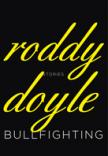Dubliners of a Certain Age
Ray Romano is best known for his performance in the mega-hit sitcom “Everybody Loves Raymond,” but in recent years he has appeared in the modest yet poignant TNT cable network show “Men of a Certain Age,” alongside Scott Bakula and Andre Braugher. I would not be surprised to learn that the best-selling Irish writer Roddy Doyle has seen an episode or two.
The men in these 13 stories by Doyle (eight of which appeared in The New Yorker) are certainly not old. They are in their 40s, but they are aware that they are now closer to old age than they are to their youths. They must confront crumbling marriages (from the story “Recuperation”: “There was no row or anything when she moved into the girls’ room.”), sputtering careers (from “Teaching”: “Things changed. It wasn’t just him…. [H]is heart wasn’t in it. He wished he was somewhere else.”) and mortality (from “The Photograph”: “They say it’s early enough…with the chemo and that.”)
One story is even entitled “The Funerals,” and deals, yes, with death but also with another inevitable aspect of advanced adulthood: elderly parents. (“He hadn’t noticed it starting. [His parents’] decline, the slide.”)
A strength of these stories, it must be added, is that they are not excessively grim or whiny. Doyle’s men still have cheerful pals down at the pub, and some have seen their marriages (even their sex lives!) flourish, now that the children are leaving the nest.
The title story, “Bullfighting,” is the longest in the collection and also one of the more curious. It is, first and foremost, about a rare creature: a contented father and husband, 48-year-old Donal.
“He’d loved the life, even the stress of it. He’d be knackered tired sometimes, red-eyed and soggy…. Making a dinner he knew none of them would eat, or charging in to Temple Street Hospital with a wheezing or a bleeding child…. [Still] the boys had been the rhythm of every day, even when he was sleeping. He woke before they did always. None of his lads had ever walked into an empty kitchen first thing in the morning,” Doyle writes.
Donal has pints with his pals at his local, where the barman is Polish and the waitress “Lithuanian…or Latvian,” which doesn’t bother Donal at all.
We’re almost waiting for the skeletons (or the pregnant mistress or the decomposing corpse) to come tumbling out of the closet. And Donal’s opportunity for transgression eventually comes when his pals decide to “go away together, to Spain.”
Much drinking and chatting and juvenile joking ensue. Before they return to Dublin, the lads visit Valencia, where Donal is stunned to see a ring for bullfighting. He sees a group of locals unload the beast, and then—shockingly—set the bull’s horns ablaze. When the animal is let loose, Donal hits the floor, though he was never in any danger. The story concludes on a more or less contented note, one that gets you thinking about a casual remark Donal’s friend had made earlier, as he tried to sell insurance. “It’s not about the years you’ve left,” he said. “It’s about the years you’ve already lived.” In a story collection defined by angst and anxiety, the chord of hard-earned satisfaction struck in “Bullfighting” rings particularly true.
Those familiar with Doyle will not be surprised by his style. When his characters are happy, they unspool lyrical Dublinisms. More often, however, with anxiety comes a clipped, disorienting voice, one that regularly contradicts itself to create a sense of anxiety. “Nothing had happened. It had just happened,” the unhappily married narrator of “The Joke” says. Meanwhile, toward the beginning of “Ash” Doyle writes: “His wife had just told him she was leaving him. Or he was leaving her. One or the other.”
“Ash” also illustrates another of Doyle’s great strengths—charting Dublin’s ongoing evolution. The story culminates with the Icelandic volcano eruption that crippled much of Europe, and that compels the father in the story to realize his daughter does not know what ash is. “There were no coal fires in the house…. There was no real religion, at home or in school, so Erica has never noticed the grey thumbprints on Ash Wednesday, on the foreheads of the old and the Polish.”
There are references to the notorious sex scandals that have rocked Ireland in recent years. Ultimately, though, this collection is a departure from Doyle’s previous story collection, The Deportees, published in 2008. That collection was focused like a laser on the changes in Ireland wrought by immigration, secularization and the economic boom and bust. Those elements are inevitably present in “Bullfighting.” But the works in The Deportees were bound by a specific formula. (Most stories were 800 words because they had initially been written as newspaper columns.) So here we have Doyle’s first proper collection of stories unbound by length or theme. It chronicles men—and a nation—reaching a certain age, an age of profound change that brings with it neither misery nor glee, but instead plenty of anxiety and uncertainty.
This article also appeared in print, under the headline “Dubliners of a Certain Age,” in the October 24, 2011, issue.








